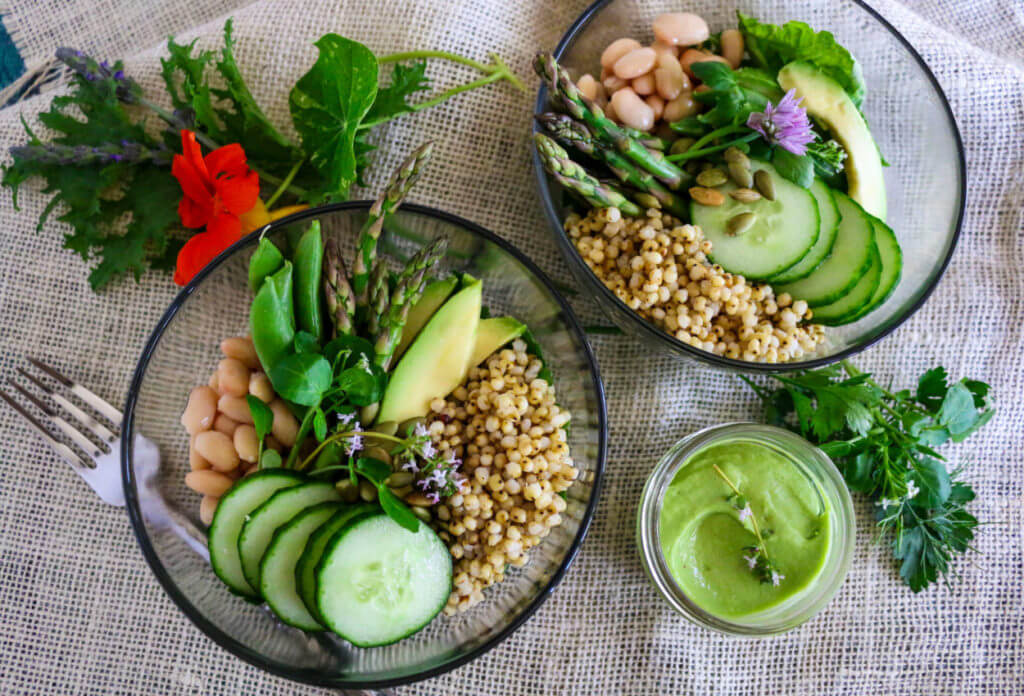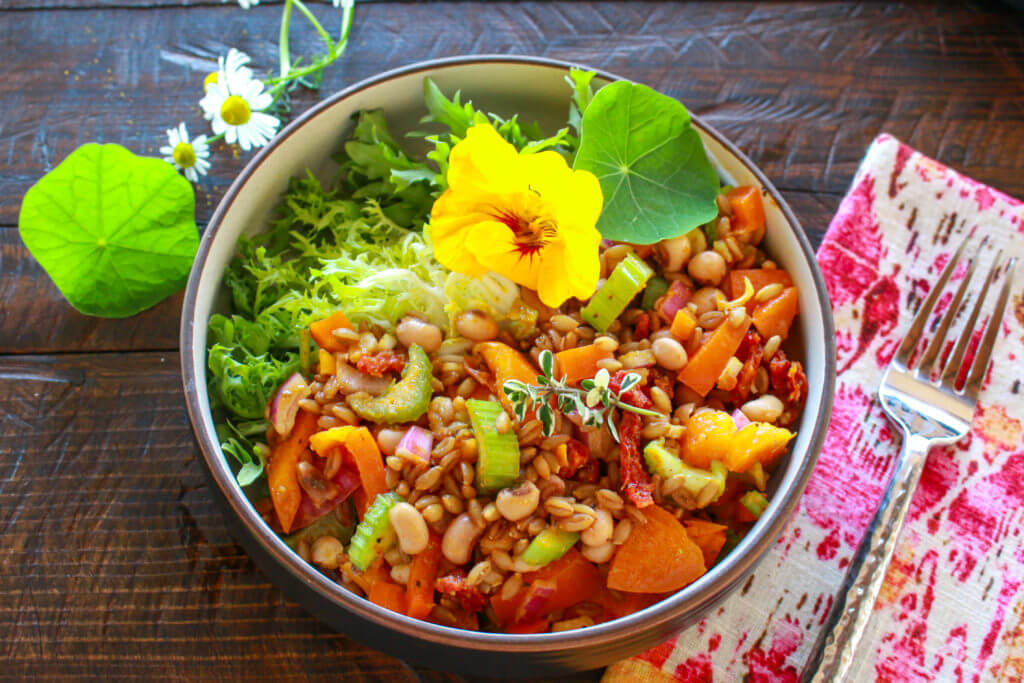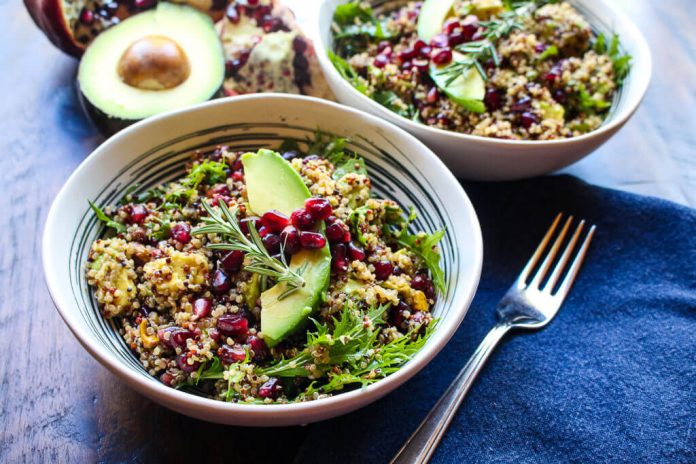What foods should you eat to promote better digestion? How much fiber and water? How do you feed your good gut bacteria? How do you fight digestive issues with diet? Sharon addresses common questions on how to eat for better digestion.
Good digestion is an awesome thing. Enjoying delicious healthful foods that promote vibrant health, energy, and wellness, without feeling any negative digestive impacts—such as constipation, bloating, gas or discomfort—is the goal! That said, many people do experience digestive issues, depending on a variety of factors. However, your diet can help you reduce symptoms of bloating, constipation, irritability, and discomfort. Unless you have a serious digestive disorder, the addition of fiber in your daily meals can improve digestion in an abundance of ways. In addition to the beneficial effects of fiber associated with digestion, it can also help to reduce the risks of certain diseases like diabetes, heart disease, and cancers. There is a wide range of plant-based foods that are considered a good source of fiber. Some examples include legumes, whole grains, vegetables, fruits, nuts, and seeds. The foods we eat play a critical factor in how our bodies react and function. Thus, it is important to fuel our bodies with the proper nutrients necessary for proper digestion. Water intake is also an important component of achieving optimal digestion because it helps to reduce constipation. And reducing your consumption of highly processed foods is key to both short and long term health. Read on to learn more about how to eat for better digestion as I answer your top questions on this topic.
How Do I Eat for Better Digestion?

Question: Looking at the standard American diet, is it generally a good idea to increase fiber intake for better digestion?
Sharon’s Answer: Yes, Americans eat a woefully low amount of fiber, because we eat the typical Western Diet, which is high in highly processed foods and animal foods, and low in whole plant foods—that’s where fiber comes from. The king of fiber is pulses, such as beans, lentils, and dried peas. The next up is whole grains, such as wheat, sorghum, barley, quinoa, and buckwheat. This category of foods is very rich in fibers. And then fruits and vegetables (preferably with peels), and nuts and seeds are also very rich in fiber. Because we don’t eat enough of these foods, we are short on fiber in our diets. For example, only 9% of Americans meet their vegetable goal. So, it’s no wonder! When you eat more fiber, you improve digestion in many ways. First of all, the fiber—the indigestible portion of the plants—absorbs water and pushes things through the digestive tract, so that you have good bowel movements. Fiber also helps reduce the risk of digestive cancers—it’s thought that pushing things through quickly reduces the exposure to compounds that increase the risks of cancer. It is also good for feeding the gut microbiota—they NEED fiber to survive in your gut, which is why high fiber diets are linked with more healthful profiles of gut microbiota. There are different types of fiber, but it’s recommended to get different types in your diet for overall good health. That’s why you should eat a varied diet with lots of different plant foods. Check out my tips on getting more fiber in your diet here.
Question: What is your advice for getting the right amount of fiber in the diet?
Sharon’s Answer: The recommendation for fiber is 25-38 grams per day, or about 14 grams for every 1000 calories you eat. So, it depends on how much food you need. The average intake is so low though—about 15 grams per day. So, if someone who only ate 15 grams per day all of a sudden ate 40 grams, they might suffer from abdominal discomfort, such as gas, bloating. The gut can gradually get used to increased fiber levels, so go slow. Remember, there are plenty of people who eat a very high fiber diet with no adverse symptoms. People who eat completely plant-based diets based on whole foods can be getting upwards of 75 grams per day! Check out these dietitian top tips for fueling your diet with fiber.
Question: Does consuming a lot of fat impede digestion?
Sharon’s Answer: Fat slows down the digestion of foods—it delays the emptying of the stomach, and how quickly carbohydrates and proteins are digested and absorbed. So including an excess amount of fat in the diet isn’t the best scenario for good digestion.

Question: How impactful can proper water consumption be on digestion?
Sharon’s Answer: Water is very important. It’s absorbed in the small intestine and some in the colon. Inadequate water consumption is linked with constipation—difficult transit, small hard stools. Fiber absorbs water in the gut, so fiber needs to be accompanied with adequate water intake.
Question: How much water should people shoot for daily?
Sharon’s Answer: The IOM recommends men drink at least 131 ounces per day; women 95 ounces per day.
Question: Does WHEN you drink water or what temperature the water is matter?
Sharon’s Answer: There is not much evidence to suggest that certain times for water consumption are better for hydration. There is also no strong evidence that it hinders digestion. Studies actually show that it can help digestion, during chewing and swallowing, and movement down the esophagus, and keeping stool soft. Studies show that differences in temperature don’t impact stomach emptying rates significantly.

Question: How do you feed your good gut bacteria for good gut health?
Sharon’s Answer: Gut microbiota feed on fiber—it is their source of nutrition. They create short chain fatty acids, which are linked with multiple health benefits. In addition, these microbes have enzymatic actions needed to break down nutrients into forms humans can utilize. Learn more about feeding your gut microbiota here.
Question: Why do processed foods harm digestion?
Sharon’s Answer: Highly processed foods—sodas, chips, candy—take up space in the diet, creating a loss of opportunity to eat healthful foods, such as whole grains, pulses, vegetables, fruits, nuts and seeds. So, one main harm is that you lose the opportunity to eat a food that promotes health—that has nutrients; because you fill up on those foods that offer none or few of those nutrients. Secondly, dietary patterns high in these highly processed, low-nutrient foods are also linked with chronic inflammation and oxidative stress, as well as poor gut microbiome profiles (low in diversity and low in numbers). They are rapidly absorbed in the bloodstream, thus putting more demand on the pancreas to produce insulin to handle the rapid rise in glucose. They provide less nutrients that the body requires for optimal health, and less fiber, which slows down gut transit, and increases risk of colon cancer.
Try these high-fiber recipes to help improve digestion:
Smoky Lentil Chili
Heirloom Bean Cassoulet with Root Vegetables
Green Goddess Grain Bowl
Sesame Tempeh Grain Bowl
Check out the other nutrition questions I’m answering at The Plant-Powered Dietitian:
Does Soy Lead to Gynecological Issues?
How do I Get Vitamin D on a Plant-Based Diet?
Can Cutting Sugar Reduce Taste for It?









